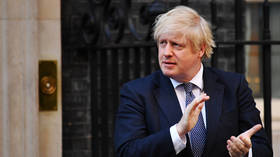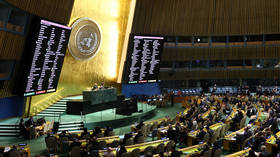Economic growth in eurozone impossible without break-up - Wolfson Prize winner
The European elite are getting the economics wrong and the current policy of austerity is not going to bring any relief, not to say economic growth, says Roger Bootle, a Wolfson Prize winner for developing a practical plan to dissolve the eurozone.
The only possible solution for the euro crisis is the departure of the peripheral countries, the renowned economist told RT.RT:This Wolfson Prize – why is it so important to you?Roger Bootle: I was fascinated by the question Lord Wolfson posed. As I thought about it, I quickly became aware that no one had really satisfactorily attempted to answer it. I thought we could learn a lot, as well as contributing quite a lot in trying to answer it. That’s what we did.RT:Take us through your winning entry.RB: Very briefly. A country wanting to leave the euro must prepare a plan in secret among a very small group of senior ministers and officials. Pretty soon as the plan is agreed it must be enacted in order to prevent the news leaking out. The banks will have to be closed over a relevant period, which is probably a weekend. During that period capital controls would be in place. On Friday night it would be announced to the people of the departing country – let’s call it Greece – that from then on all amounts that were in bank accounts, be it their pensions or wages which were formerly expressed in euros were now to be expressed in drachmas. We suggest that the conversion rate between the euro and drachmas be one for one. All the people get this mixed up. They all think “what about the exchange rate?” On the exchanges there is no connection between the official conversion rate and what the drachma trades at. We’re pretty sure that it would trade at a much lower rate, probably at around 1.5 to one or even two to one against the euro.Then the banks open again on Monday or Tuesday, people put their cards into ATMs. They can get euros out of their bank accounts, which are now expressed in drachma, but they get those out at the exchange rate that rules now between the euro and drachma because now the euro is treated as a foreign currency.Initially, they are not going to have drachma notes and coins available and a lot of people would get fixated on that. We argue that that does not really matter, for the overwhelming majority of transactions, particularly business transactions, they are done electronically anyway. People use debit and credit cards. They continue to do that, only now it is drachma they are actually transacting.For small transactions that require cash our suggestion is that Greece carries on using euros until new drachma notes are available.RT:But euros at the exchange rate or euros on the new one-to-one parity?RB: What will tend to happen is that a dual price system would develop. Because people will know that drachmas aren’t the same as euros, that though they have been converted at a one-to-one rate, there tends to be a different price for euro cash on drachma debit and credit cards. That would be to some extent messy, but it would be perfectly practical. There are a lot of countries in the world that operated dual-currency and a dual-pricing system.RT:This all sounds very simple. But in terms of real people using their money are there other complications on the micro-economic level?RB: There are huge complications and problems. One of the biggest is going to concern the legal position, because what would happen at the point when Greece leaves the euro it would re-denominate its national debt into drachma. As far as domestic Greek residents are concerned, changes are going to stand in a Greek law and Greek courts. There are going to be all sorts of contracts involving non-Greek citizens where there is going to be a lot of legal argy-bargy, because let`s say a German creditor is not going to want his assets converted into drachma and he is going to argue that the contract was framed in euros and it should still be in euros and in Greece they are going to say, “oh no, no, no, it`s now in drachma.” And so there are going to be arguments. The court is going to be heavily involved. But the scope for this can also be reduced if eurozone governments reach an agreement on this, which they probably would, but they will have to lay down guidelines under which terms the contracts are going to be interpreted in drachma and in which occasions it will be in euros. This would minimize the scope for legal argument. The other major issue, and it is not a complication, it is a reality, is that initially this is going to be very far from a magic wand. When the drachma falls on the exchanges, the price of goods and services in Greece is going to go up – possibly by quite a lot. So, initially, living standards are going to be squeezed. Far from bringing relief to the ordinary Greek person, it is actually going to make matters worse initially. However, going forward things will then completely transform because in a flash Greece is more competitive, not the grinding deflation they were in for ten or fifteen years, but instantaneously Greece is forty or fifty or sixty per cent more competitive and the demand for Greek output is going to take off. That does not happen overnight, but in a measure of months that will happen. Greek exports will start to rise, Greek imports will fall. That would generate employment and more income in Greece. So there is a trade-off, a difficult period to go through first of all in order to secure later greater prosperity.RT:So if you compare that situation to the austerity that Greeks are now facing, which would you say is a better plan?RB: I think there is no doubt Greece needs to get out of the euro. I cannot see any way in which this current policy of austerity is going to bring any relief. There is a grinding process of trying to bring prices and wages down, but it takes not years but decades.And what is more it raises the real value of debt. Greece and other weaker members of the euro face not one key problem, but two. They are uncompetitive and they are also settled with very high levels of debt. The problem with domestic deflation is in principle that it deals with one of these problems, namely the lack of competitiveness but at the cost of making the other problem – debt – even worse. RT:Euro proponents seem to fear that the break-up of the eurozone is some kind of Armageddon. Is this fear realistic?RB: They are right to fear the break-up of the eurozone. If Greece, for instance, leaves, before very long other countries will leave as well and we will end up probably with the peripheral countries – possibly all five of them: Portugal, Italy, Ireland, Greece and Spain – all outside the euro, possibly joined by France, with some northern core remaining. So in terms of what might happen I think these people are absolutely right. With regard to the consequences, though, they are completely wrong. The leaders of Europe have to ask themselves how you can imagine prosperity and stability for Europe under the current set-up. What is the mechanism through which countries – that are at the moment mired in not just a recession but a depression – through which those countries regain prosperity, economic growth and stability? I wish they could tell us something because all I hear whenever they have a summit is banging on about various ways of debt support and never about economic growth. I do not think it is possible to imagine a return to economic growth under the current set-up. By contrast, if the euro breaks, I can imagine the economic growth. So, far from being a disaster I think it could be the major step that leads to the restoration of growth in Europe. RT:What about these attempts to shore up the eurozone that we have seen recently? Another bailout for Greece, cheap money flooding international banks from the ECB, are they going to have any effect?RB: It is possible to keep the whole show on the road that way if the northern countries are prepared to carry on shoveling this money into the southern countries. Although there will come a limit because eventually the sums involved are going to be absolutely enormous. The voters in the northern countries will say we don`t want all this. But even if the continued shoveling of money does take place, which keeps the show on the road again, that does not actually bring economic growth in the south. All it is doing it is preventing a financial collapse. RT:Is what we are seeing just a fight between politics and economics? Is the reason why Angel Merkel is so desperate to keep the eurozone together because it is the major political project that Germany has implemented over the last thirty years or so? RB: I think the politics and the economics are really very closely intertwined and it is always difficult to work out where one stops and the other begins. You have to appreciate that the European elite did not have a pretty firm grasp of the economics from the start. Now they are getting the economics completely wrong. That is to say, the opposition to the idea they fear, the idea that a euro break-up isn’t just about the politics. They think that the economics point very strongly that way as well. Because they fear the financial chaos that would stem from a euro break-up. And they do not see the benefits to economic growth. I think they are opposed on both economic and political grounds. RT:We talk about the collapse of the euro, but all through this the currency has been oddly resilient, only really winding down now from quite a decent rate against the dollar. What do you put that down to?RB: This is a really big puzzle, why the euro has been so strong. There are reasons that one can put forward, but I am not myself completely convinced by any of them. But one thing to bear in mind is that foreign exchange markets are notoriously short-sighted. And the argument against the euro has always been that essentially it would collapse through its own contradictions – as to when, people have been unable to say. Well, exchange markets tend not to bet on things like if this happens next year, maybe next month, maybe in five years’ time, it is not really a very solid thing to go on. Then there is also the question of what form the euro might take if it survives because if the weaker countries leave the eurozone, arguably the euro is going to be a strong currency. RT:If the euro becomes a currency that applies to fewer countries will it still retain its attractiveness for investors? RB: The euro could continue to be a very attractive currency indeed. For many people it might be even more attractive if you could imagine that what is going to happen is the departure of the weaker peripheral countries – Portugal, Italy, Ireland, Greece and Spain, perhaps even France, then the euro is, as it were, greater Deutsche, it is Germany and its close satellites, and it is going to be run by this currency area, presumably the way Germany used to be run under the Deutsche Mark and accordingly I think investors will like this currency very much.















